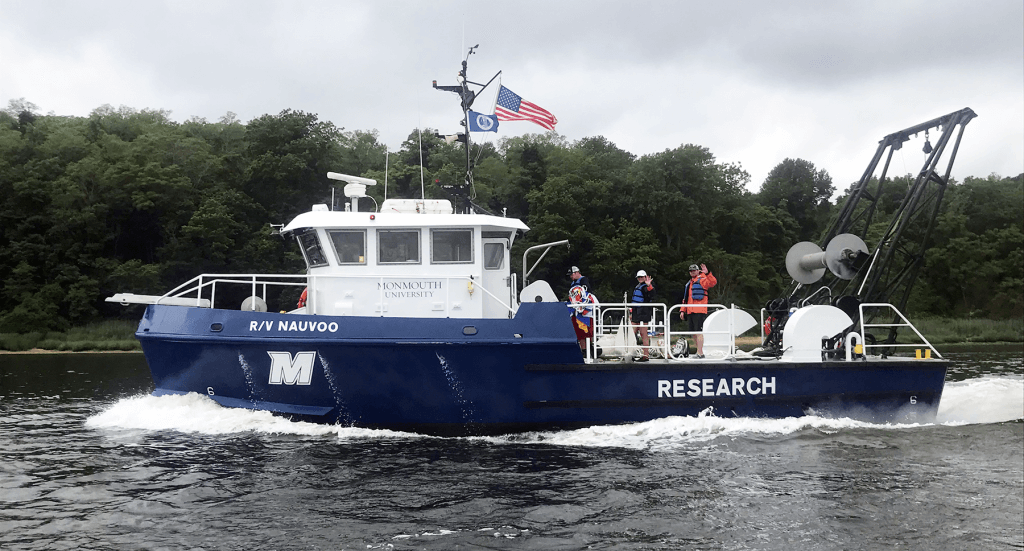Monmouth University leaders, faculty and students were joined by state and federal officials today to unveil the newest and largest member of the university’s research vessel fleet – the 49-foot Nauvoo.
The acquisition of the Nauvoo will enable the Monmouth University Urban Coast Institute (UCI) to conduct research, educational and contract work at a larger scale than ever before. It will also substantially enhance in-house research and monitoring capabilities to meet increasing faculty and student demand within the School of Science’s Marine and Environmental Biology and Policy Program.
The vessel will make it possible to take full classes and large groups on the water and work on the open ocean up to 20 nautical miles offshore. Overnight research trips on the water are now possible, as the vessel has a head and the capacity to berth seven.
“Few universities throughout the East Coast have a research vessel of this class,” Monmouth University President Grey Dimenna said. “The Nauvoo will advance our growth as a premier marine research and policy center in the region. For students interested in marine science, this is yet another great reason to come study at our beautiful coastal campus.”
 The Nauvoo is outfitted with state-of-the-art technologies including a side-scan sonar system that provides highly detailed views of underwater terrains. The vessel will provide critical support for in-house scientists and students, and additional capacity to work collaboratively with government agencies, academic institutions and NGOs on areas of critical concern such as oyster restoration, shore erosion and channel shoaling.
The Nauvoo is outfitted with state-of-the-art technologies including a side-scan sonar system that provides highly detailed views of underwater terrains. The vessel will provide critical support for in-house scientists and students, and additional capacity to work collaboratively with government agencies, academic institutions and NGOs on areas of critical concern such as oyster restoration, shore erosion and channel shoaling.
Originally built as a U.S. Coast Guard buoy tender, the Nauvoo was later transferred to the National Oceanic and Atmospheric Administration (NOAA), which provided it to the University in 2017 at no cost. The vessel has since undergone extensive maintenance and improvement work. It joins two smaller UCI-maintained vessels that have long served the university’s primary marine field operations and research needs – the 18-foot Little Hawk and 27-foot Seahawk.
“We thank NOAA for this valuable contribution to the marine science and education work taking place at Monmouth University,” UCI Director Tony MacDonald said. “The Nauvoo will provide students with a truly transformational learning experience, and further advance the UCI’s mission to develop the best available science to support healthy and productive coastal ecosystems and sustainable communities.”
“We are thrilled to help support Monmouth University’s developing marine research program with the donation of our 49-foot research vessel, R/V Nauvoo,” said Jon Hare, director of NOAA’s Northeast Fisheries Science Center, which includes the NOAA Sandy Hook Laboratory.
The Nauvoo will provide the university with a platform for expanding collaborative research with NOAA and other universities and regional partners. “We are very pleased that the vessel will continue to play an important role in our strong and growing cooperation with Monmouth University in pursuit of our shared vision to responsibly manage our marine resources,” Hare said.
Among the current university projects the vessel will aid are a probe of sediment contamination in New York Harbor; ongoing research on distributions and behaviors of the endangered Atlantic sturgeon and sharks off the New Jersey and New York coasts; collaboration with Rockefeller University on testing regional waters for environmental DNA (eDNA) fragments that can confirm the presence of fish and other marine organisms; studies of harmful algae blooms in coastal waters; water quality monitoring and testing; and fisheries surveys for state and federal agencies.
New Jersey State Sen. Vin Gopal and Assemblyman Eric Houghtaling, who represent the coastal district that includes Monmouth’s West Long Branch campus, presented a resolution honoring the critical research work performed by the university.
“The first step in addressing the challenges that face the New Jersey’s marine environments is understanding them,” Gopal said. “The research that will be conducted on the Nauvoo will help inform important coastal policy decisions, while at the same time training a new generation of marine scientists.”
“It has been a pleasure to watch Monmouth University’s growth as a leader on coastal issues that continue to grow in importance for our communities, from dealing with sea level rise to understanding how pollution is impacting wildlife in our waters,” Houghtaling said. “The student body and faculty are taking full advantage of their access to the greatest laboratory in the world – the New Jersey Shore.”
